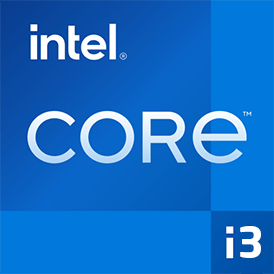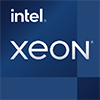
Intel Core i3-3220 Benchmark, test e specifiche
Ultimo aggiornamento:
Il Intel Core i3-3220 ha 2 core con 4 thread ed è basato sul 3. Gene della serie Intel Core i3. Il processore utilizza una scheda madre con il socket LGA 1155 ed è stato rilasciato in Q3/2012. Intel Core i3-3220 ottiene 648 punti nel benchmark single-core di Geekbench 5. Nel benchmark multi-core di Geekbench 5, il risultato è 1.376 punti.

| Cognome: | Intel Core i3-3220 |
|---|---|
| Famiglia: | Intel Core i3 (205) |
| Gruppo CPU: | Intel Core i 3000 (31) |
| Architettura : | Ivy Bridge S |
| Segmento: | Desktop / Server |
| Generazione: | 3 |
| Predecessore: | -- |
| Successore: | -- |
CPU Cores e frequenza di base
Intel Core i3-3220 ha 2 core CPU e può calcolare 4 thread in parallelo. La frequenza di clock di Intel Core i3-3220 è 3,30 GHz. Il numero di core della CPU influisce notevolmente sulla velocità del processore ed è un importante indicatore delle prestazioni.
| CPU Cores / Threads: | 2 / 4 |
|---|---|
| Architettura principale: | normal |
| Cores: | 2x |
| Hyperthreading / SMT: | Si |
|---|---|
| Overclocking: | No |
| Frequenza: | 3,30 GHz |
| Turbo Frequenza (1 Core ): | -- |
| Turbo Frequenza (2 Cores): | -- |
Grafica interna
Intel Core i3-3220 ha una grafica integrata, chiamata iGPU in breve. Nello specifico, Intel Core i3-3220 utilizza Intel HD Graphics 2500, che ha 48 texture shader e 6 unità di esecuzione. L'iGPU utilizza la memoria principale del sistema come memoria grafica e si trova sul die del processore.
| nome GPU: | Intel HD Graphics 2500 |
|---|---|
| Frequenza GPU : | 0,65 GHz |
| GPU (Turbo ): | 1,05 GHz |
| Unità di esecuzione: | 6 |
| Shader: | 48 |
| Hardware Raytracing: | No |
| Data di lancio : | Q2/2012 |
| Max. visualizzazioni: | 3 |
|---|---|
| Generation: | 7 |
| Direct X: | 11.0 |
| Tecnologia : | 22 nm |
| Max. GPU Memoria: | 2 GB |
| Frame Generation: | No |
Hardware codec support
Un codec fotografico o video accelerato nell'hardware può accelerare notevolmente la velocità di lavoro di un processore e prolungare la durata della batteria di notebook o smartphone durante la riproduzione di video.
| h265 / HEVC (8 bit): | No |
|---|---|
| h265 / HEVC (10 bit): | No |
| h264: | Decodificare / Codificare |
| VP8: | No |
| VP9: | No |
| AV1: | No |
|---|---|
| AVC: | Decodificare / Codificare |
| VC-1: | Decodificare |
| JPEG: | Decodificare |
Memoria & PCIeIl processore può utilizzare fino a 32 GB memoria in 2 (Dual Channel) canali di memoria. La larghezza di banda massima della memoria è 25,6 GB/s. Il tipo di memoria e la quantità di memoria possono influire notevolmente sulla velocità del sistema. |
|
| Tipo di memoria : | Banda di memoria: |
|---|---|
| DDR3-1600 | 25,6 GB/s |
| Max. Memoria: | 32 GB |
| Canali di memoria : | 2 (Dual Channel) |
| ECC: | No |
| PCIe: | 2.0 x 16 |
| PCIe Larghezza di banda: | 8,0 GB/s |
Gestione termicaLa potenza di progettazione termica (TDP in breve) del processore è 55 W. Il TDP specifica la soluzione di raffreddamento necessaria per raffreddare sufficientemente il processore. Il TDP di solito dà un'idea approssimativa dell'effettivo consumo energetico della CPU. |
|
|---|---|
| TDP (PL1 / PBP): | 55 W |
| TDP (PL2): | -- |
| TDP up: | -- |
| TDP down: | -- |
| Tjunction max.: | -- |
Dettagli tecnici
Il Intel Core i3-3220 è realizzato in 22 nm. Più piccolo è il processo di produzione di una CPU, più è moderna ed efficiente dal punto di vista energetico. Nel complesso, il processore ha 3,00 MB cache. Una cache di grandi dimensioni può accelerare notevolmente la velocità del processore in alcuni casi, ad esempio nei giochi.
| Tecnologia : | 22 nm |
|---|---|
| Design a chip: | Monolitico |
| Presa: | LGA 1155 |
| L2-Cache: | -- |
| L3-Cache: | 3,00 MB |
| AES-NI: | Si |
| Sistemi operativi: | Windows 10, Linux |
| Virtualizzazione: | VT-x, VT-x EPT |
|---|---|
| Set di istruzioni (ISA): | x86-64 (64 bit) |
| Estensioni ISA: | SSE4.1, SSE4.2, AVX |
| Data di lancio : | Q3/2012 |
| Prezzo di rilascio: | 117 $ |
| Numero di parte: | -- |
| Documenti: | Scheda tecnica |
Valuta questo processore
Risultati di benchmark

I risultati del benchmark per Intel Core i3-3220 sono stati attentamente controllati da noi. Pubblichiamo solo risultati di benchmark che sono stati creati da noi o che sono stati inviati da un visitatore e poi controllati da un membro del team. Tutti i risultati sono basati e rispettano le nostre linee guida di benchmark.
Geekbench 5, 64bit (Single-Core)
Geekbench 5 è un benchmark multi-piattaforma che usa in modo intensivo la memoria del sistema.Il test single-core utilizza solo un nucleo elaborativo della CPU. A tal fine, il numero di nuclei elaborativi o la capacità di hyperthreading non sono rilevanti.

|
Intel Core i5-2300
4C 4T @ 3,10 GHz |
||

|
Intel Core i5-680
2C 4T @ 3,86 GHz |
||

|
Intel Core i5-2500T
4C 4T @ 3,30 GHz |
||
|
|
Intel Core i3-3220
2C 4T @ 3,30 GHz |
||

|
Intel Core i3-3225
2C 4T @ 3,30 GHz |
||

|
Intel Xeon E7-4880 v2
15C 30T @ 3,10 GHz |
||

|
MediaTek Kompanio 820
8C 8T @ 2,20 GHz |
||
Geekbench 5, 64bit (Multi-Core)
Geekbench 5 è un benchmark multi-piattaforma che usa in modo intensivo la memoria del sistema.Il test multi-core coinvolge tutti i nuclei elaborativi della CPU e si avvale del hyperthreading.
|
|
HiSilicon Kirin 710
8C 8T @ 2,20 GHz |
||

|
Intel Core i3-4100M
2C 4T @ 2,50 GHz |
||

|
Intel Core i5-5250U
2C 4T @ 2,50 GHz |
||
|
|
Intel Core i3-3220
2C 4T @ 3,30 GHz |
||

|
Intel Core i5-8200Y
2C 4T @ 2,80 GHz |
||

|
Intel Core i3-3225
2C 4T @ 3,30 GHz |
||

|
Intel Core i7-3687U
2C 4T @ 3,30 GHz |
||
Geekbench 6 (Single-Core)
Geekbench 6 è un punto di riferimento per computer, notebook e smartphone moderni. Ciò che è nuovo è un utilizzo ottimizzato delle architetture CPU più recenti, ad esempio basate sul concetto big.LITTLE e combinando core CPU di diverse dimensioni. Il benchmark single-core valuta solo le prestazioni del core della CPU più veloce, il numero di core della CPU in un processore è irrilevante qui.

|
Intel Pentium G3220
2C 2T @ 3,00 GHz |
||

|
Intel Xeon Bronze 3106
8C 8T @ 1,70 GHz |
||

|
Intel Core i5-2540M
2C 4T @ 3,30 GHz |
||
|
|
Intel Core i3-3220
2C 4T @ 3,30 GHz |
||

|
Intel Core i3-3225
2C 4T @ 3,30 GHz |
||

|
Intel Core i5-2500T
4C 4T @ 3,30 GHz |
||

|
AMD Ryzen Embedded V1500B
4C 8T @ 2,20 GHz |
||
Geekbench 6 (Multi-Core)
Geekbench 6 è un punto di riferimento per computer, notebook e smartphone moderni. Ciò che è nuovo è un utilizzo ottimizzato delle architetture CPU più recenti, ad esempio basate sul concetto big.LITTLE e combinando core CPU di diverse dimensioni. Il benchmark multi-core valuta le prestazioni di tutti i core della CPU del processore. I miglioramenti del thread virtuale come AMD SMT o l'Hyper-Threading di Intel hanno un impatto positivo sul risultato del benchmark.
|
|
HiSilicon Kirin 710
8C 8T @ 2,20 GHz |
||

|
Intel Core i3-2130
2C 4T @ 3,40 GHz |
||

|
Intel Core i3-5005U
2C 4T @ 2,00 GHz |
||
|
|
Intel Core i3-3220
2C 4T @ 3,30 GHz |
||

|
Intel Core i3-3225
2C 4T @ 3,30 GHz |
||

|
Intel Core i7-2640M
2C 4T @ 2,80 GHz |
||

|
Intel Pentium Silver J5005
4C 4T @ 2,70 GHz |
||
Cinebench R20 (Single-Core)
Cinebench R20 è il successore di Cinebench R15 ed è anch'esso basato su Cinema 4D. Cinema 4D è un software usato a livello mondiale per creare forme in 3D. Il test single-core utilizza solo un nucleo elaborativo della CPU. A tal fine, il numero di nuclei elaborativi o la capacità di hyperthreading non sono rilevanti.

|
Intel Pentium G4560
2C 4T @ 3,50 GHz |
||

|
Intel Xeon E5-2620 v4
8C 16T @ 3,00 GHz |
||

|
Intel Xeon E5-2697 v4
18C 36T @ 3,60 GHz |
||
|
|
Intel Core i3-3220
2C 4T @ 3,30 GHz |
||

|
AMD A12-9800
4C 4T @ 4,20 GHz |
||

|
Intel Celeron N5105
4C 4T @ 2,90 GHz |
||

|
Intel Core i5-2400
4C 4T @ 3,40 GHz |
||
Cinebench R20 (Multi-Core)
Cinebench R20 è il successore di Cinebench R15 ed è anch'esso basato su Cinema 4D. Cinema 4D è un software usato a livello mondiale per creare forme in 3D. Il test multi-core coinvolge tutti i nuclei elaborativi della CPU e si avvale del hyperthreading.

|
AMD FX-9830P
4C 4T @ 3,40 GHz |
||

|
Intel Core i5-8200Y
2C 4T @ 2,80 GHz |
||

|
Intel Core i5-8310Y
2C 4T @ 3,00 GHz |
||
|
|
Intel Core i3-3220
2C 4T @ 3,30 GHz |
||

|
Intel Celeron J4105
4C 4T @ 2,40 GHz |
||

|
Intel Core i5-8210Y
2C 4T @ 2,80 GHz |
||

|
Intel Core i7-5600U
2C 4T @ 3,10 GHz |
||
iGPU - Prestazioni FP32 (GFLOPS a precisione singola)
Le prestazioni di calcolo teoriche dell'unità grafica interna del processore con precisione semplice (32 bit) in GFLOPS. GFLOPS indica quanti miliardi di operazioni in virgola mobile che l'iPPU può eseguire al secondo.

|
Intel Celeron G1610
Intel HD Graphics (Ivy Bridge GT1) @ 1,05 GHz |
||

|
Intel Pentium G2010
Intel HD Graphics (Ivy Bridge GT1) @ 1,05 GHz |
||

|
Intel Pentium G2020
Intel HD Graphics (Ivy Bridge GT1) @ 1,05 GHz |
||
|
|
Intel Core i3-3220
Intel HD Graphics 2500 @ 1,05 GHz |
||

|
MediaTek Helio P70
ARM Mali-G72 MP3 @ 0,90 GHz |
||

|
UNISOC T616
ARM Mali-G57 MP1 @ 0,75 GHz |
||

|
Intel Pentium 2117U
Intel HD Graphics (Ivy Bridge GT1) @ 1,00 GHz |
||
Risultati stimati da PassMark CPU Mark
Alcune delle CPU elencate di seguito sono stati sottoposti a benchmarking da CPU-monkey. Tuttavia, la maggior parte delle CPU non sono state testate e i risultati sono stati stimati utilizzando una formula segreta di proprietà di CPU-monkey. Come tali, essi non riflettono con precisione i valori attuali di Passmark CPU Mark e non sono stati approvati da PAssMark Software Pty Ltd.

|
Intel Celeron J3455
4C 4T @ 2,20 GHz |
||

|
AMD Phenom II X2 521
2C 2T @ 3,50 GHz |
||

|
AMD Athlon II X4 638
4C 4T @ 2,70 GHz |
||
|
|
Intel Core i3-3220
2C 4T @ 3,30 GHz |
||

|
Intel Core i3-3225
2C 4T @ 3,30 GHz |
||

|
AMD Phenom II X4 840T
4C 4T @ 3,20 GHz |
||

|
Intel Celeron N6211
2C 2T @ 2,40 GHz |
||
CPU-Z Benchmark 17 (Single-Core)
Il benchmark CPU-Z misura le prestazioni di un processore misurando il tempo impiegato dal sistema per completare tutti i calcoli del benchmark. Più velocemente viene completato il benchmark, maggiore è il punteggio.

|
Intel Core i5-7200U
2C 4T @ 3,10 GHz |
||

|
Intel Core i3-3240
2C 4T @ 3,40 GHz |
||

|
Intel Core i7-6500U
2C 4T @ 2,80 GHz |
||
|
|
Intel Core i3-3220
2C 4T @ 3,30 GHz |
||

|
Intel Core i5-6300U
2C 4T @ 2,60 GHz |
||

|
Intel Xeon E5450
4C 4T @ 3,00 GHz |
||

|
Intel Core i3-2120
2C 4T @ 3,30 GHz |
||
CPU-Z Benchmark 17 (Multi-Core)
Il benchmark CPU-Z misura le prestazioni di un processore misurando il tempo impiegato dal sistema per completare tutti i calcoli del benchmark. Più velocemente viene completato il benchmark, maggiore è il punteggio.

|
Intel Core i5-4210M
2C 4T @ 2,60 GHz |
||

|
AMD Ryzen 3 3250U
2C 4T @ 2,60 GHz |
||

|
AMD A10-6800K
4C 4T @ 4,10 GHz |
||
|
|
Intel Core i3-3220
2C 4T @ 3,30 GHz |
||

|
Intel Core i3-2130
2C 4T @ 3,40 GHz |
||

|
Intel Core i5-6300U
2C 4T @ 2,40 GHz |
||

|
Intel Core i5-4200M
2C 4T @ 2,50 GHz |
||
Cinebench R15 (Single-Core)
Cinebench R15 è il successore di Cinebench 11.5 ed è anch'esso basato su Cinema 4D. Cinema 4D è un software usato a livello mondiale per creare forme in 3D. Il test single-core utilizza solo un nucleo elaborativo della CPU. A tal fine, il numero di nuclei elaborativi o la capacità di hyperthreading non sono rilevanti.

|
Intel Core i5-4258U
2C 4T @ 2,90 GHz |
||

|
Intel Core i5-6198DU
2C 4T @ 2,80 GHz |
||

|
Intel Core i7-4785T
4C 8T @ 3,20 GHz |
||
|
|
Intel Core i3-3220
2C 4T @ 3,30 GHz |
||

|
Intel Core i3-6167U
2C 4T @ 2,70 GHz |
||

|
Intel Xeon E5-2683 v3
14C 28T @ 3,00 GHz |
||

|
Intel Xeon E5-2650 v3
10C 20T @ 3,00 GHz |
||
Cinebench R15 (Multi-Core)
Cinebench R15 è il successore di Cinebench 11.5 ed è anch'esso basato su Cinema 4D. Cinema 4D è un software usato a livello mondiale per creare forme in 3D. Il test multi-core coinvolge tutti i nuclei elaborativi della CPU e si avvale del hyperthreading.

|
Intel Core i3-4330T
2C 4T @ 3,00 GHz |
||

|
Intel Celeron J4125
4C 4T @ 2,70 GHz |
||

|
Intel Xeon E3-1220L v3
4C 8T @ 1,50 GHz |
||
|
|
Intel Core i3-3220
2C 4T @ 3,30 GHz |
||

|
AMD Athlon II X4 860K
4C 4T @ 4,00 GHz |
||

|
Intel Core i3-6167U
2C 4T @ 2,70 GHz |
||

|
Intel Core i3-3225
2C 4T @ 3,30 GHz |
||
Benchmarks

Geekbench 5 (SC)
2.479 inserimenti
2.479 inserimenti

Geekbench 5 (MC)
2.452 inserimenti
2.452 inserimenti

Geekbench 6 (SC)
1.745 inserimenti
1.745 inserimenti

Geekbench 6 (MC)
1.693 inserimenti
1.693 inserimenti

Cinebench R20 (SC)
654 inserimenti
654 inserimenti

Cinebench R20 (MC)
602 inserimenti
602 inserimenti

FP32 SP (iGPU)
2.010 inserimenti
2.010 inserimenti

PassMark CPU-Mark
2.386 inserimenti
2.386 inserimenti

CPU-Z Benchmark 17 (SC)
230 inserimenti
230 inserimenti

CPU-Z Benchmark 17 (MC)
732 inserimenti
732 inserimenti

Cinebench R15 (SC)
1.106 inserimenti
1.106 inserimenti

Cinebench R15 (MC)
1.101 inserimenti
1.101 inserimenti

Geekbench 3 (SC)
942 inserimenti
942 inserimenti

Geekbench 3 (MC)
938 inserimenti
938 inserimenti

Cinebench R11.5 (SC)
825 inserimenti
825 inserimenti

Cinebench R11.5 (MC)
836 inserimenti
836 inserimenti

Cinebench R11.5 iGPU
383 inserimenti
383 inserimenti
Confronti più popolari
Torna all'indice





